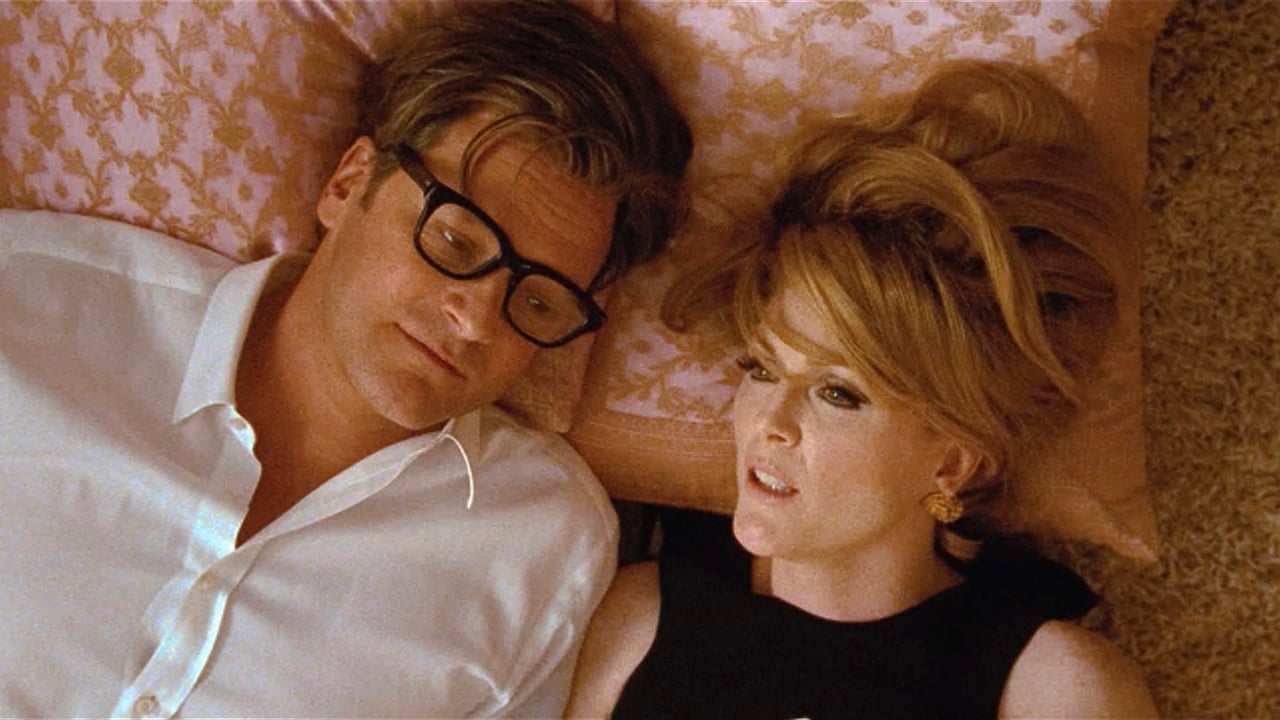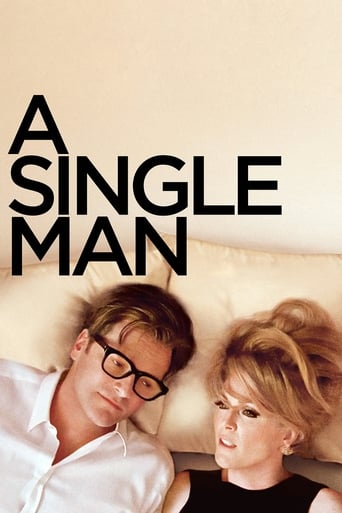DipitySkillful
an ambitious but ultimately ineffective debut endeavor.
Ogosmith
Each character in this movie — down to the smallest one — is an individual rather than a type, prone to spontaneous changes of mood and sometimes amusing outbursts of pettiness or ill humor.
Payno
I think this is a new genre that they're all sort of working their way through it and haven't got all the kinks worked out yet but it's a genre that works for me.
Ginger
Very good movie overall, highly recommended. Most of the negative reviews don't have any merit and are all pollitically based. Give this movie a chance at least, and it might give you a different perspective.
Dave
This film is set on 30 November 1962 in Southern California. It stars Colin Firth as a depressed, homosexual, university professor who is bereaved of his partner and is contemplating suicide.Julianne Moore gives a great performance as the protagonist's best friend - which is the only good thing about the film.This film is dull and miserable for the viewers. Firth's character chooses not to kill himself - but he dies of a heart attack later the same day. This film was misleadingly promoted as including a romance between Firth and Moore's characters.
avik-basu1889
The first and foremost thing that one notices while watching Tom Ford's 'A Single Man' starring Colin Firth is the glossy visual texture of the film which makes every frame look extremely glamorous, shiny and attractive. Now there are critics who have accused Ford of bringing his overt fashion designing sensibilities to the screen and overdoing and over-glamorising the film. Personally I can understand why someone might raise this issue, but I think the over-stylisation is a specific artistic choice and it serves a thematic purpose. One of the primary themes of the film is the concept of living in perpetual fear. There is a extended lecture that George(Firth) delivers in his class to his students about how this fear can have varied roots and forms and the methods to counter this fear varies too. George's own fears are the results of a combination of factors. One of them being the fact that he is a minority, a homosexual living in a society that doesn't completely accept diversity in sexuality. Another huge and overbearing reason for his fears is his crippling sense of loneliness after his partner, Jim's sudden death. It is clear that Jim's love and acceptance gave George a sense of fulfillment. Without Jim, he has mentally slipped into a state of emotional confinement. He uses the lavish, intricate and meticulously designed interiors of his house, the sharp clothes and clean cut appearance to hide his inner grief. He morphs into the smooth, charming and handsome image that everyone expects to see in order to hide his inner turmoil and pain. So this is where Tom Ford's over-stylised set designs and visuals become into play as when this context is taken into account, one will understand that Ford is using these 60s inspired sets not because he has a passion for designing 60s era sets and clothes, but because George himself is using these things as an armour.Everything that happens during the day depicted in the film is shown from George's point of view. We get fleeting shots of things that are drawing his attention in a particular moment through jump cuts and quick editing. Ford also adjusts the visual colour palette and texture to reflect the mental state of George in specific scenes. We shift from the bland texture of normality to over-saturation to frames being splashed with vibrant red or blue. Of course this is influenced by similar artistic choices by Hitchcock in 'Vertigo' and there's also a scene that takes place with a huge poster of 'Psycho' in the background. But other than Hitchcock, the dreamy and intentionally melodramatic tone that is set by Ford right from the first scene with the melancholic score reminded me of the so called "women's pictures" from the 1950s like Douglas Sirk's 'All that Heaven Allows' which also involved artistic use of colour. Ford also uses a number of Sirk- esque shots of reflections on mirrors and other glass surfaces to visually express emotional repression and confinement. Some of the visual metaphors and directorial choices might be a bit too on-the-nose and not on the subtle side, but considering the melodramatic tone that is set by Ford, those moments of overtness seem appropriate and not out of place.From a visual standpoint, Tom Ford clearly shows the presence of an artistic vision and meticulous craftsmanship. But for me he is a bit weak when it comes to tackling and writing conversation scenes. The screenplay written by Ford and David Scearce based on the novel written by Christopher Isherwood works well on a broader level in terms of setting up the character of George and exploring his fears. But I think the writing fails in giving us sharp and insightful dialogue in a few scenes especially the scenes involving George and Kenny which are essential to give us an understanding of the connection between the two characters. This weak dialogue stands out as a blot in an otherwise highly impressive directorial debut.Colin Firth deserves almost as much praise for this film as Tom Ford. He shoulders this film from start to finish and gives us a deeply moving performance. We all know he can play the smooth and sophisticated side of George, the side that George presents to the world. But what Firth really excels at are the scenes where the facade drops and the 'real' George in his solitude appears in front of us. 'A Single Man' has some problems when it comes to the quality and potency of dialogue in some crucial scenes, however one can't help but admire the depth in the exploration of a lonely man's fears and insecurities. Tom Ford's artistic and visual craftsmanship and of course Colin Firth's marvellous performance makes this an easy recommendation.
palavitsinis
Although this movie is watched easily today, one has to think what it meant back in those days to have different sexual preferences than the majority of the population. The character depicted by Colin Firth is immaculate. He is such a talented actor, but still this role came as a shock for me. The way he behaved when relaxed and the way he changed completely when in the company of his friend or companion was breathtaking.I really liked the idea of adding color to some moments to showcase his state of mind at the time. This movie is not easy to digest, mainly cause it goes against all sorts of stupid clichés that are still part of our societies. But it is a movie about losing a loved one and it clearly depicts that feeling of hopelessness that comes with. The hero of the movie seems to be finding a moment of clarity towards the end and this is also something that stands true for all of us, no matter how big the loss is. Life goes on, and this was a message that was apparent throughout the movie. It's a sad movie but one that allows you to rethink of the things you value, the things that oppress you and the things that don't allow you to be yourself. And once you think of all these things to just ignore them and live your life to the fullest.
Jenny Bender
A Single Man is a work of art. The acting and cinematography are both superb and are what make this movie. Tom Ford's aesthetic eye is clearly visible throughout, as the movie is visually stunning (though a lot of that credit also has to go to production manager Dan Bishop and dp Eduard Grau).The use of an older, grainer film works wonderfully. It helps set the time period while simultaneously giving a sense of timelessness and nostalgia. I have never seen color used as beautifully and effectively in any other film as it is in this one. The color is leached from George much of the time to show his emptiness and isolation. Whenever he makes a connection with someone, color makes its way back in the picture. Towards the beginning, as he lays in bed contemplating loneliness and suicide, it is very washed out. Not long later, he sees the secretary at his office, and she smiles at him. There is a close-up of her lips, and the red from her lipstick is emphasized. The color visually represents the feeling and you can actually see the warmth of her smile and its effect on George.The music is also phenomenal. Abel Korzeniowski based the entire score on one simple melodic theme, which helps to unify the film as one piece, as one single day. The melody builds and is finally completed at the end of the movie. I have not read the book, but the movie is excellent and given Ford's reverence for the source material, I can only assume it is a quality adaptation. The storyline itself is transformative and intimate, and the ending is bittersweet. Mostly bitter. I take solace in the fact that George died happy, but the irony and the sadness of him finally choosing life and having so much potential, only to have it stolen… it was to me, the most tragic ending there could have been, even more tragic than if he had committed suicide, because at least then, he would have been getting what he wanted.Overall, the movie is excellent and I highly recommend it to everyone.

